Political aspirations of the Kazakhstani youth
DOI:
https://doi.org/10.34767/SIIP.2016.15.16Keywords:
political aspirations, youth, values, political culture, political activity.Abstract
In the article data presented from the sociological research conducted in 2015 indicate that the participation of youth in politics and the interest is very low. Monitoring of political orientations in the projection on regional identity showed some significant differences: the youth of the “Northern”, “Western” and “Eastern” regions is with a tendency to the “troubled” perception of the political situation, while respondents of “Southern” and “Central” regions with the “neutral” assessment of and with a high degree of political tolerance and displaying the ability to political discourse. The political profile of young Kazakhs is characterized by a greater degree of uncertainty. Also, the boundaries of political preferences are blurred: the main factors of the formation of the ideological and political positions are to the greater extent cultural (preferences and stereotypes) rather than social factors.
References
Herder J.G., Ideen zur Philosophie der Geschichte der Menschheit Herder J.G “Zur Philosophie der Geschichte”. EineAuswahl in 2 Bd. Bd.2, Berlin 1952.
Almond G., Comparative Political Systems “Journal of Politics” Gainesville, 1956. Vol.18, No.3.
James E.J., The Place of the Political and Social Science in Modern Education, and their Beaming on the Training for Citizenship in a Free State “The Annals of the American Academy of Political and Social Science” Philadelphia, 1897. Vol.10, No.3.
Струве П.Б., Политика внутренняя и политика внешняя “Струве П. Patriotica: Политика, культура, религия, социализм” Сб. статей за пять лет: (1905–1910 гг.), Санкт-Петербург 1911.
Wolfinger R.E., Rosenstone S.J., Who votes? New Haven 1980.
Woodward J.L., Roper E., Political activity of American citizens, “The American Political Science Review” 44 (4), 1950.
Converse P.E., Perspectives on the democratic process, “Michigan Quarterly Review”, no 27, 1988.
Timpone R.J., Ties that bind: Measurement, demographics and social connectedness, Political Behavior, 1998, 20 (1).
Hyman H.H., Wright C.R., Reed J.S., The enduring effects of education. Chicago 1975.
Ольшанский Д.В., Основы политической психологии. Екатеринбург 2011.
Абдирайымова Г.С., Алимбекова Г.Т., Ценностный портрет казахстанской молодежи: выбор, стратегии и предпочтения (некоторые итоги трех лет). Материалы Астанинского социологического форума, посвященного Дню Первого Президента Республики Казахстан. Межд. науч.- прак. конф. / Отв. ред. З.К. Шаукенова, Астана 2015.
Downloads
Published
Issue
Section
License
Copyright (c) 2016 Świat Idei i Polityki

This work is licensed under a Creative Commons Attribution 4.0 International License.

